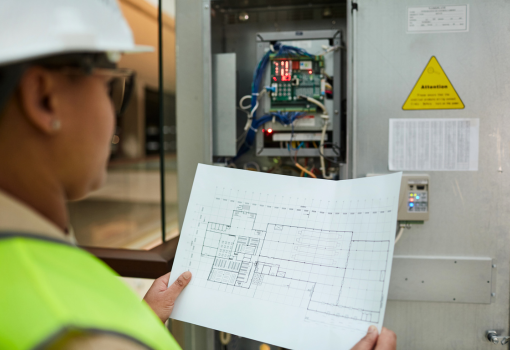Electrical inspections are a crucial aspect of property safety and efficiency. Whether you own a home, manage a commercial building, or are in the process of purchasing a new property, a professional electrical inspection ensures compliance with safety standards and prevents costly electrical failures. In this blog, we will explore the importance of electrical inspections, when they are necessary, and how they benefit both residential and commercial clients.
The Importance of Electrical Inspections
Electrical systems power everything from lighting to HVAC systems, making their reliability and safety a priority. Here are some key reasons why electrical inspections are essential:
1. Ensuring Safety
Faulty wiring and outdated electrical systems can lead to hazardous situations such as electrical fires, shocks, or system failures. Inspections identify potential risks before they become dangerous.
2. Compliance with Electrical Codes
Building codes change over time, and an outdated system may not meet current safety regulations. Electrical inspections ensure compliance with the National Electrical Code (NEC) and local electrical requirements.
3. Energy Efficiency & Cost Savings
Outdated or damaged electrical systems can increase energy consumption. A thorough inspection can identify inefficiencies, helping property owners reduce energy costs.
4. Preventing Expensive Repairs
Electrical issues that go unnoticed can lead to costly emergency repairs or system overhauls. Routine inspections help detect minor problems before they escalate.
5. Insurance & Liability Requirements
Many insurance companies require electrical inspections, especially for older properties. Compliance can help prevent denied claims in the event of electrical damage.

When Should You Get an Electrical Inspection?
Regular electrical inspections can prevent a wide range of issues. Here are the key times when scheduling an inspection is critical:
1. New Construction Builds
Every new residential or commercial building must undergo an electrical inspection before occupancy. This ensures the system is installed correctly and meets all necessary regulations.
2. Buying a New Home or Commercial Property
Before finalizing a property purchase, an electrical inspection helps identify any hidden issues that could become costly repairs down the line.
3. Before Selling a Property
Homeowners and commercial property owners looking to sell should have an inspection to ensure there are no electrical issues that could delay a sale or lower property value.
4. After Major Renovations or Additions
If you’ve added new rooms, appliances, or electrical components to your property, an inspection ensures everything is properly installed and safe.
5. After Experiencing Electrical Issues
Frequent circuit breaker trips, flickering lights, burning smells, or sparking outlets are all signs that your electrical system needs immediate inspection.
6. Periodic Maintenance Inspections
For older homes and commercial buildings, routine inspections every 3–5 years help prevent problems and ensure ongoing safety and efficiency.
What to Expect During an Electrical Inspection
A certified electrician will evaluate the following during an inspection:
- Wiring and circuits for damage, overheating, or wear
- Electrical panels and breakers to ensure proper functioning
- Outlets and switches for grounding and safety compliance
- Smoke detectors and safety devices to confirm they are operational
- Code compliance to ensure the system meets local and national regulations
After the inspection, the electrician will provide a detailed report outlining any necessary repairs or upgrades.
Choosing a Professional for Your Electrical Inspection
When selecting an electrician, ensure they are licensed, insured, and experienced in residential and commercial inspections. At Let There Be Light Electric, we provide thorough electrical inspections to keep your property safe and compliant.
Need an inspection? Contact Let There Be Light Electric today at 504-729-8902 to schedule your professional electrical assessment.
Conclusion
Electrical inspections are a vital step in maintaining a safe, efficient, and compliant property. Whether you’re a homeowner, business owner, or property investor, scheduling regular inspections can prevent costly problems and ensure your electrical system operates safely. Don’t wait until an emergency arises—get your inspection today!
How long does an electrical inspection take?
The time required for an electrical inspection depends on the size and complexity of the property. A standard home inspection typically takes 1-2 hours, while a commercial inspection may take several hours or more.
How much does an electrical inspection cost?
Costs vary based on the property size and location, but residential inspections generally range from $150 to $500. Commercial inspections may cost more due to additional complexity.
What happens if my property fails an electrical inspection?
If your property fails, the electrician will provide a detailed report outlining the issues and necessary repairs. Once the problems are addressed, you can schedule a re-inspection.
Do I need an inspection if I haven’t noticed any issues?
Yes, even if there are no visible problems, underlying issues may exist. Regular inspections help prevent unexpected failures and ensure ongoing compliance with safety codes.
Can I do my own electrical inspection?
While you can check for obvious signs of damage, only a licensed electrician can perform a thorough inspection and ensure compliance with electrical codes.
Are electrical inspections required by law?
In many cases, yes. Inspections are required for new construction, major renovations, and before selling a property. Local laws may also mandate periodic inspections.

0 Comments